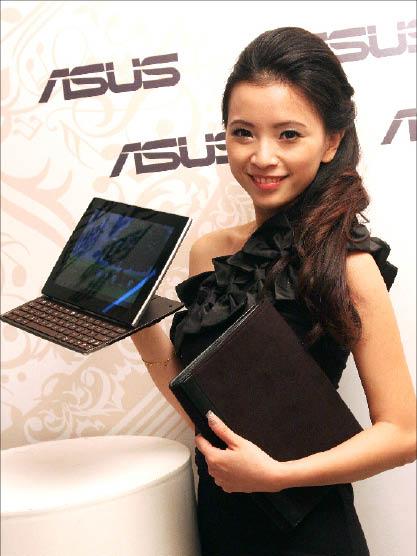Asustek Computer Inc (華碩), the world’s No. 5 PC brand, yesterday said its upcoming UX series Ultrabook platform would fail to carry price tags of less than US$1,000, as claimed by Intel Corp.
“Unless we use Intel Core i3 chips [the Ultrabooks will not be less than US$1,000]. The price tags will have to go beyond US$1,000 if [more advanced] i5 and i7 chips go into the notebooks,” a person familiar with UX development said.
The UX series will mainly use i5 and i7 to boost performance, he said.

Photo Courtsey of ASUS
The i5 and i7 chips, which are more expensive, plus the operating system and solid-state hard drives would account for about 50 percent of the cost of the ultraslim notebooks, thus driving up the price of the UX series to between US$1,000 and US$2,000, he said.
The UX series, showcased by Asustek at the Computex tech trade fair in late May, aims to rival MacBook Air from Apple Inc.
The UX series has two models — one is 11.6 inches and weighs 1.1kg, while the other is 13.3 inches and weighs 1.3kg.
Intel touted the Ultrabook platform at Computex, saying it would make notebooks thinner, lighter and more affordable, with price tags of less than US$1,000, while adding that battery life would last longer than 10 hours.
Asustek is likely to be the first vendor to debut Ultrabooks. The person said it was on track for a debut in Taiwan in late September.
Other companies, such as Acer Inc (宏碁) and Hewlett-Packard Co, reportedly plan to roll out Ultrabooks by the end of the year.
The person’s comments echoed those of Asustek general sales manager Kevin Lin (林福能), who said earlier this month that the price tags for the UX series would go above US$1,000 based on various specs.
Daiwa Capital Market’s analyst Calvin Huang (黃文堯) said on July 13 that Intel was merely cutting prices for its low-voltage processors to help thin and light notebooks make a comeback.
However, in Huang’s view, Intel’s help might not be enough because to make an Ultrabook, other more advanced and expensive components — such as ultrathin panels, solid-state hard drives, metal casings, high-density interconnect and polymer batteries — are required to make it comparable to the MacBook Air.
Separately, Fitch Ratings yesterday upgraded Asustek’s long-term foreign currency issuer default rating to “BBB” from “BB+” and its national long-term rating to “A+(twn)” from “A-(twn),” with a stable outlook.
“The upgrade reflects Asustek’s increase in market share and significant improvements to its -financial profile. The company’s focus on quality and innovation is gradually translating into market share gains and growing customer loyalty,” Fitch analyst Kevin Chang (張崇人) said in an e-mailed statement.
Asustek, which pioneered the mini-size notebook PC — also known as a netbook — market in 2009, is also the world’s largest provider of PC motherboards and graphic cards.

Shiina Ito has had fewer Chinese customers at her Tokyo jewelry shop since Beijing issued a travel warning in the wake of a diplomatic spat, but she said she was not concerned. A souring of Tokyo-Beijing relations this month, following remarks by Japanese Prime Minister Sanae Takaichi about Taiwan, has fueled concerns about the impact on the ritzy boutiques, noodle joints and hotels where holidaymakers spend their cash. However, businesses in Tokyo largely shrugged off any anxiety. “Since there are fewer Chinese customers, it’s become a bit easier for Japanese shoppers to visit, so our sales haven’t really dropped,” Ito

The number of Taiwanese working in the US rose to a record high of 137,000 last year, driven largely by Taiwan Semiconductor Manufacturing Co’s (TSMC, 台積電) rapid overseas expansion, according to government data released yesterday. A total of 666,000 Taiwanese nationals were employed abroad last year, an increase of 45,000 from 2023 and the highest level since the COVID-19 pandemic, data from the Directorate-General of Budget, Accounting and Statistics (DGBAS) showed. Overseas employment had steadily increased between 2009 and 2019, peaking at 739,000, before plunging to 319,000 in 2021 amid US-China trade tensions, global supply chain shifts, reshoring by Taiwanese companies and

Taiwan Semiconductor Manufacturing Co (TSMC) Chairman C.C. Wei (魏哲家) and the company’s former chairman, Mark Liu (劉德音), both received the Robert N. Noyce Award -- the semiconductor industry’s highest honor -- in San Jose, California, on Thursday (local time). Speaking at the award event, Liu, who retired last year, expressed gratitude to his wife, his dissertation advisor at the University of California, Berkeley, his supervisors at AT&T Bell Laboratories -- where he worked on optical fiber communication systems before joining TSMC, TSMC partners, and industry colleagues. Liu said that working alongside TSMC

TECHNOLOGY DAY: The Taiwanese firm is also setting up a joint venture with Alphabet Inc on robots and plans to establish a firm in Japan to produce Model A EVs Manufacturing giant Hon Hai Precision Industry Co (鴻海精密) yesterday announced a collaboration with ChatGPT developer OpenAI to build next-generation artificial intelligence (AI) infrastructure and strengthen its local supply chain in the US to accelerate the deployment of advanced AI systems. Building such an infrastructure in the US is crucial for strengthening local supply chains and supporting the US in maintaining its leading position in the AI domain, Hon Hai said in a statement. Through the collaboration, OpenAI would share its insights into emerging hardware needs in the AI industry with Hon Hai to support the company’s design and development work, as well